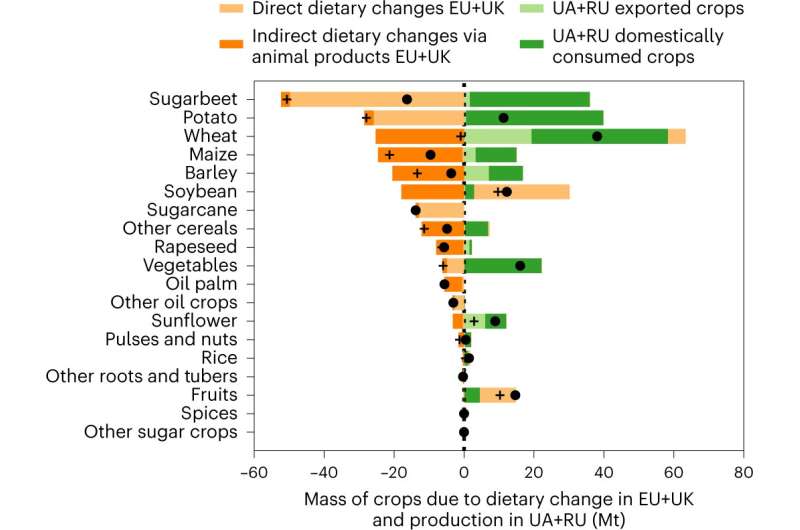Changing our diet would help absorb global food shocks, international study finds

A plant-based diet could improve the resilience of our food system. Moving to such a diet in the European Union (EU) and United Kingdom (U.K.) alone could replace almost all the production losses from Russia and Ukraine. That's what an international team of researchers conclude in Nature Food. Leiden researcher and co-author Paul Behrens: "We are feeding animals crops that we could eat ourselves."
"Conflict and other drivers of food shocks, such as floods and droughts, are putting pressure on food production across the world," said Zhongxiao Sun at the China Agricultural University and the paper's lead author. "A rapid shift to plant-based diets could help us bounce back from shocks while reducing water use, lowering emissions, improving our health, providing more natural areas, and much more."
The war in Ukraine has had a major impact on the global food supply. Russia and Ukraine are major producers of staple crops such as sunflower oil and wheat. Global food insecurity had been growing steadily for some time, but the conflict has pushed food prices to record highs.
Reducing overconsumption
The researchers investigated the land saved by a shift to the across EU and U.K. countries. Shifting to this plant-based diet would reduce food requirements by almost the same amount of food produced in both Ukraine and Russia. It could absorb the large shock of losing these major food producers. Additionally, the diet would also be better for the environment and health across high-income nations.
"This opportunity arises because these countries overconsume animal products and sugars," Leiden researcher Paul Behrens and senior author of the research said. "Animals are fed crops that could be eaten directly by people: 30–40% of all crops are fed to animals. In the EU and U.K., this number rises to 60%. Animal agriculture also occupies about 80% of all agricultural land."
Freeing up agricultural space
The researchers found that moving to plant-based diets across the EU and U.K. could free up an area slightly larger than the size of France and the U.K. combined. Some of this land could be used to replace the lost crops from production shocks around the world.
Replacing all export crops from Russia and Ukraine would require about 16% of this saved land. It would also provide several environmental benefits including reduced water use, lower emissions and better biodiversity depending on how the saved land were used.
Don't wait 'until nature makes the decision for us'
"We are moving into a period of increasing shocks to the food system," Behrens said.
"We know that plant-based diets dramatically reduce environmental impacts, but they could also help improve food security. Given the opportunity, even small cuts in animal consumption help. If we do not make these dietary shifts, prices will increase as climate impacts and conflicts get worse, making animal products increasingly expensive. It's better to make these changes today, rather than waiting until nature makes the decision for us and the damage is already done."
More information: Qian Zhang, Adoption of plant-based diets across Europe can improve food resilience against the Russia–Ukraine conflict, Nature Food (2022). .
Journal information: Nature Food
Provided by Leiden University





















